グローバルリーダー協会の齋藤です。
Unikaで海外営業に配属されますが、Ronさんを待ち受けていたのは?
日本の中小企業の現状は今も大きくは変わらないのではないでしょうか。
Unfortunately, I cannot do any sales training within Unika, as the owner has his own style of selling which he requests the staff to follow. Also, for some overseas markets using Japanese or selling through trading company, he also directly gets involved. Regarding overseas markets using English, that is where I have been able to achieve a great deal. I tried to stay away from all the markets established before I came to the company in Japanese. That seemed to be successful, as no one is interfering with someone else’s market.
Being an American with English as my first language, I did find both language and communications problems when I first came to Unika. Regarding the language, the staff used terms that I was not familiar with. Also, because the job content was different than that of Isuzu Motors, there was specialty terms I had to learn. That took a few years.
Regarding general communication, I noticed a great lack of information sharing particularly in the area of costing and supply chain management. This is a management style I was not used to but later on learned that many small companies both in Japan and overseas are very similar. I was very difficult to learn if a product for a given market would be viable or not. I was able to overcome that problem though with many one-on-one, behind the scenes discussions with key people with the appropriate information. I learned to confirm all verbal statements several times.
Also, with the characters of the owners, developing alliances and strategic partners are a real challenge. This is probably one of the reasons they stay small.
The Unika products are not that competitive worldwide like Isuzu Motors trucks, so I had to be very careful in not spending a lot of time, energy and money in markets in which we could not offer a product that is needed.
In March, 2002, after being in the company only three months, I exhibited the Unika products in Cologne Germany. At that time, there were only two small companies that purchased from Unika. One was in the UK and one in France. The company did not even have the expertise of reserving space at an international exhibition, so they shared the booth with a company that did have that expertise.
When I first came to the company, the English catalogues and sales promotion material was very poor and needed to be revised. For the first exhibition, I did not have good promotional material, but that exhibition taught me what needed to be achieved. Also, I had a customer database of only 29 companies worldwide. In most cases, I should have had at least several hundred, possibly even a thousand names and companies to work with. So, I had to start from scratch which is OK. With all that sales training, I did know how develop my own network.
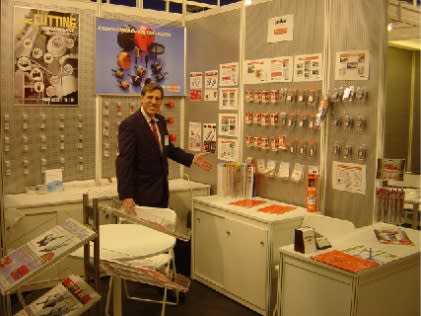
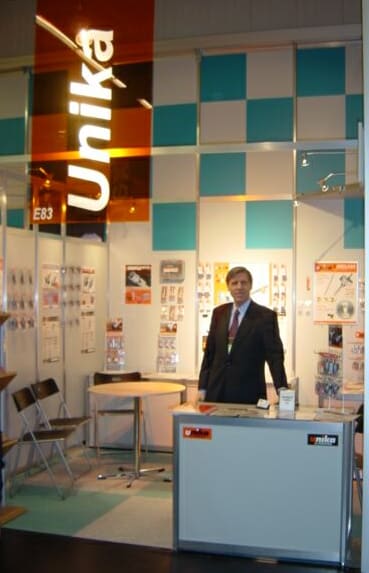
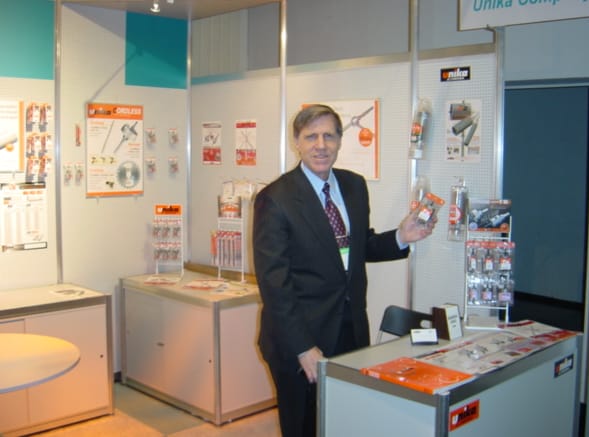
Exhibition in Germany, 2002~2004
For the first two years, we shared the booth, but it was always so crowded that for the third year, I reserved our own booth. That was more successful, and I learned how to plan an exhibition at a trade show. By then, I improved all point of purchase materials and had a better customer database. So, I could invite more customers to visit us at the booth.
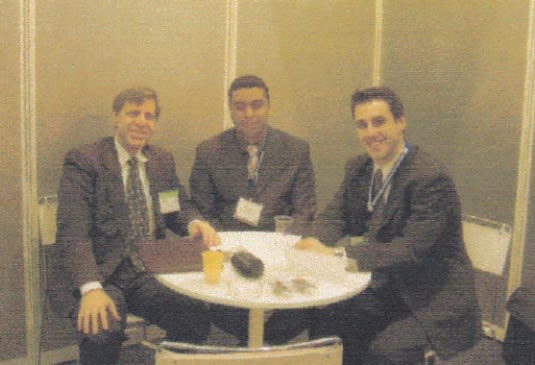
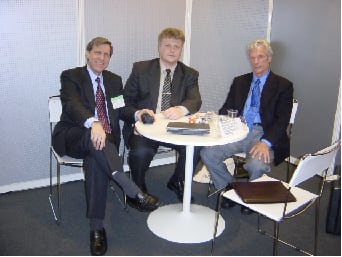

Meetings with French, Finnish and Danish customers in Germany, 2002~2004
***************************************************************************************
齋藤信幸の生産財の営業はここ。
齋藤信幸のロングステイはここ。
***************************************************************************************
Unikaで海外営業に配属されますが、Ronさんを待ち受けていたのは?
日本の中小企業の現状は今も大きくは変わらないのではないでしょうか。
Unfortunately, I cannot do any sales training within Unika, as the owner has his own style of selling which he requests the staff to follow. Also, for some overseas markets using Japanese or selling through trading company, he also directly gets involved. Regarding overseas markets using English, that is where I have been able to achieve a great deal. I tried to stay away from all the markets established before I came to the company in Japanese. That seemed to be successful, as no one is interfering with someone else’s market.
Being an American with English as my first language, I did find both language and communications problems when I first came to Unika. Regarding the language, the staff used terms that I was not familiar with. Also, because the job content was different than that of Isuzu Motors, there was specialty terms I had to learn. That took a few years.
Regarding general communication, I noticed a great lack of information sharing particularly in the area of costing and supply chain management. This is a management style I was not used to but later on learned that many small companies both in Japan and overseas are very similar. I was very difficult to learn if a product for a given market would be viable or not. I was able to overcome that problem though with many one-on-one, behind the scenes discussions with key people with the appropriate information. I learned to confirm all verbal statements several times.
Also, with the characters of the owners, developing alliances and strategic partners are a real challenge. This is probably one of the reasons they stay small.
The Unika products are not that competitive worldwide like Isuzu Motors trucks, so I had to be very careful in not spending a lot of time, energy and money in markets in which we could not offer a product that is needed.
In March, 2002, after being in the company only three months, I exhibited the Unika products in Cologne Germany. At that time, there were only two small companies that purchased from Unika. One was in the UK and one in France. The company did not even have the expertise of reserving space at an international exhibition, so they shared the booth with a company that did have that expertise.
When I first came to the company, the English catalogues and sales promotion material was very poor and needed to be revised. For the first exhibition, I did not have good promotional material, but that exhibition taught me what needed to be achieved. Also, I had a customer database of only 29 companies worldwide. In most cases, I should have had at least several hundred, possibly even a thousand names and companies to work with. So, I had to start from scratch which is OK. With all that sales training, I did know how develop my own network.



Exhibition in Germany, 2002~2004
For the first two years, we shared the booth, but it was always so crowded that for the third year, I reserved our own booth. That was more successful, and I learned how to plan an exhibition at a trade show. By then, I improved all point of purchase materials and had a better customer database. So, I could invite more customers to visit us at the booth.



Meetings with French, Finnish and Danish customers in Germany, 2002~2004
***************************************************************************************
齋藤信幸の生産財の営業はここ。
齋藤信幸のロングステイはここ。
***************************************************************************************

















